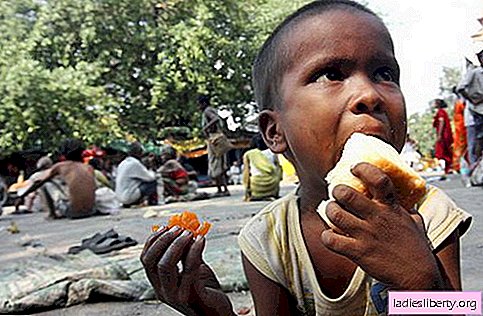
Child theft is considered a terrible shame for the whole family. What to do if a child steals?
Parents of the child who committed the theft are reluctant to share this problem with teachers and psychologists. Is everything so terrible and irreversible, and why do children steal other people's things?
The child steals: a threat to the future or the norm of development
Many parents and teachers, having learned that the child has committed theft, immediately hang a label of criminal activity on this act. But is child theft a wake-up call?
To clearly answer this question, you just need to remember - did you steal in childhood? Almost every child, regardless of age, stole the following things:
• Other's toys
• Parents' money
• Sweets
A large percentage of people stole the above things, but they did not become criminals. More often than not, children steal such things without malicious intent.
At a very early preschool age, the kids do not understand the difference between “their own” and “alien”, therefore they steal without realizing it. The period of unconscious theft can last up to 6 years. Of course, this boundary depends on the conscientiousness of the parents, since the sooner and more intelligibly the concept of the property of others is explained to the child, the faster and better he will learn this rule in life.
Why is a child stealing?
There are a lot of reasons for child theft, since, first of all, this problem is psychological, that is, many reasons from outside influence its formation.
1. Stolen gift
One of the reasons for child theft can be a very harmless desire - to make a gift. Children, especially at the youngest preschool age, strongly express love for their family, even despite the unfavorable situation in some of them. Toddlers often give various stolen items to adults, but due to age they can not realize that gifts should be obtained in a different way.
If the child brought a ring stolen from the caregiver, then you should not immediately hang the label of the criminal on the baby and imagine his criminal future in bright colors. It is enough to explain to the thief that someone else's thing is not a gift.
2. Desire
It often happens that after visiting a children's store, a stolen toy is discovered in a child. This example is by no means the only one, since children's “want” is more than anything else.
Yes, children can steal simply because they really want to take possession of a particular thing. In such cases, they understand that they are doing something illegal and will not be praised for such an act, but they cannot restrain themselves.
But what is so complicated? Perhaps it is worth developing willpower in your children? In fact, theft for this reason is not subject to correction. For people almost until the age of 21, a self-control system remains unformed, that is, they physiologically cannot regulate the strength of their desires.
3. Symbol of authority
This reason for theft is often found among adolescents 14-19 years old. The fact is that children with low self-esteem, who have difficulty communicating with their peers, believe that a brand item will increase their social status in the company of peers. Brand clothes, equipment and other attributes are inaccessible to many adolescents, so they find the only solution to their psychological and material problems - theft.
In this case, you can only adjust the self-esteem of the teenager, having resorted to the help of a professional psychologist. Basically, the desire for self-affirmation through fashionable attributes goes away with age.
4. Theft "for the company"
Theft by a group of children is most often committed against trinkets and sweets. Of course, such dirty tricks are mainly committed by boys who try to prove to each other their courage and audacity.
The fear of punishment in a child in this case is reduced, since they will scold not only one, but all the participants of the deed. And if he got into the company of older children, who are his authority, or if his parents did not educate the child on theft, then the daredevil forms an opinion: if everyone does this, then this is normal.
5. Revenge
Children can steal in order to cause an unpleasant feeling of loss from the one with whom they are in a conflict. Most often, the subject of theft is a very valuable thing for the "enemy".
6. Stressful situation
Stress is considered a common cause of child theft. A child commits such an act, unconsciously trying to attract the attention of adults.
Also, during stress, children are not able to control their emotions and desires, since an already unformed self-control system cannot work effectively.
How not to react to theft of the child?
Before considering a competent reaction, you need to pay attention to the fact that for a child things of a different price category are equivalent. That is, if parents can not really lament over the stolen toy, then someone else’s gadget found in his pocket will be equated to a crime. Children do not pay much attention to the value of the stolen item.
So, there are a great many examples of "correct" reactions to theft of a child, but what errors exist?
• Swearing
Of course, such an act of a child can shock parents and they, under the influence of emotions, begin to scold him, not trying to find out the origin of the problem. Adults paint a criminal future for a child and position their behavior as the end of a good reputation. In this situation, it is important to remember: children must be sure that their parents will be on their side, even if they committed a bad deed. At the moment of rage, you need to stop and think: is there any point in expressing discontent? What needs to be achieved: to humiliate a child or prevent such events in the future?
• Insults
During abuse, parents struck by the perfect act tend to insult the child and focus on his “acquired” status. Often children hear: "You are a felon!", "Thief", "You have one road to prison."
Such humiliation of a child is groundless. Of course, theft is not the act for which they pat on the head, but it is also not so large-scale and exclusively this act to humiliate your child.
• Comparison
It is important to understand that in comparison, at least, there is no point. Everyone committed misconduct, especially as a teenager. You should not compare the child with yourself, peers and children of friends, as he can also get a feeling of resentment against the parent. The theft in this case will continue, but already, as described above, for the sake of revenge.
Also, by constantly comparing your child with others, you can lower his self-esteem. Children with low self-esteem do not believe that they are able to change, which means that the theft situation will remain unresolved.
• Public censure
It is categorically impossible to scold a child on witnesses, especially for a shameful misconduct, since by doing so you humiliate his personality and lower his self-esteem.
• Permanent Reminders
In order not to raise a child as a "criminal", you do not need to constantly remind him of misconduct. Regular conversations about the deed will reduce the level of trust between the child and the parent, and will also lower his self-esteem.
What to do if a child steals and how to fix the situation?
The reasons and errors are understandable, but how to completely eradicate the desire to steal from a child?
1. Explanation
You need to explain even in preschool age. It is necessary to give the child information about the feelings of the person who suffered the loss due to the theft of his valuable thing.
Also, it is necessary to tell the child about various ways to get the desired thing: exchange a toy with a friend, ask to buy parents or write a letter to Santa Claus.
2. Support
It is important to convey to the child that this is just a life test and absolutely everyone faces difficulties. You can tell him about your bad deed in childhood, share with him your story of overcoming yourself.
3. Search for the origin of the problem
There are many reasons for theft of children, however, the deficit unites them all. A child can steal due to the fact that he lacks attention and support. Also, children steal due to low self-esteem and a desire to join the company of peers. Parent task: find out the origin of the problem and eradicate it.
4. Correction
This paragraph refers to increased work on bugs. A child is not able to objectively evaluate his behavior, so explaining and showing what to do in a given situation is the task of the parents. If the child has committed theft, then you need to show him how you can influence the situation in order to change it for the better. For example, consider options for returning the stolen item, at least secretly, or do something good so as not to feel like a bad person.
Child theft is not a sentence at all and is not a guarantee of a criminal future. If the child is stealing, then you should only listen to him, understand what he is missing and correct the situation in time.











